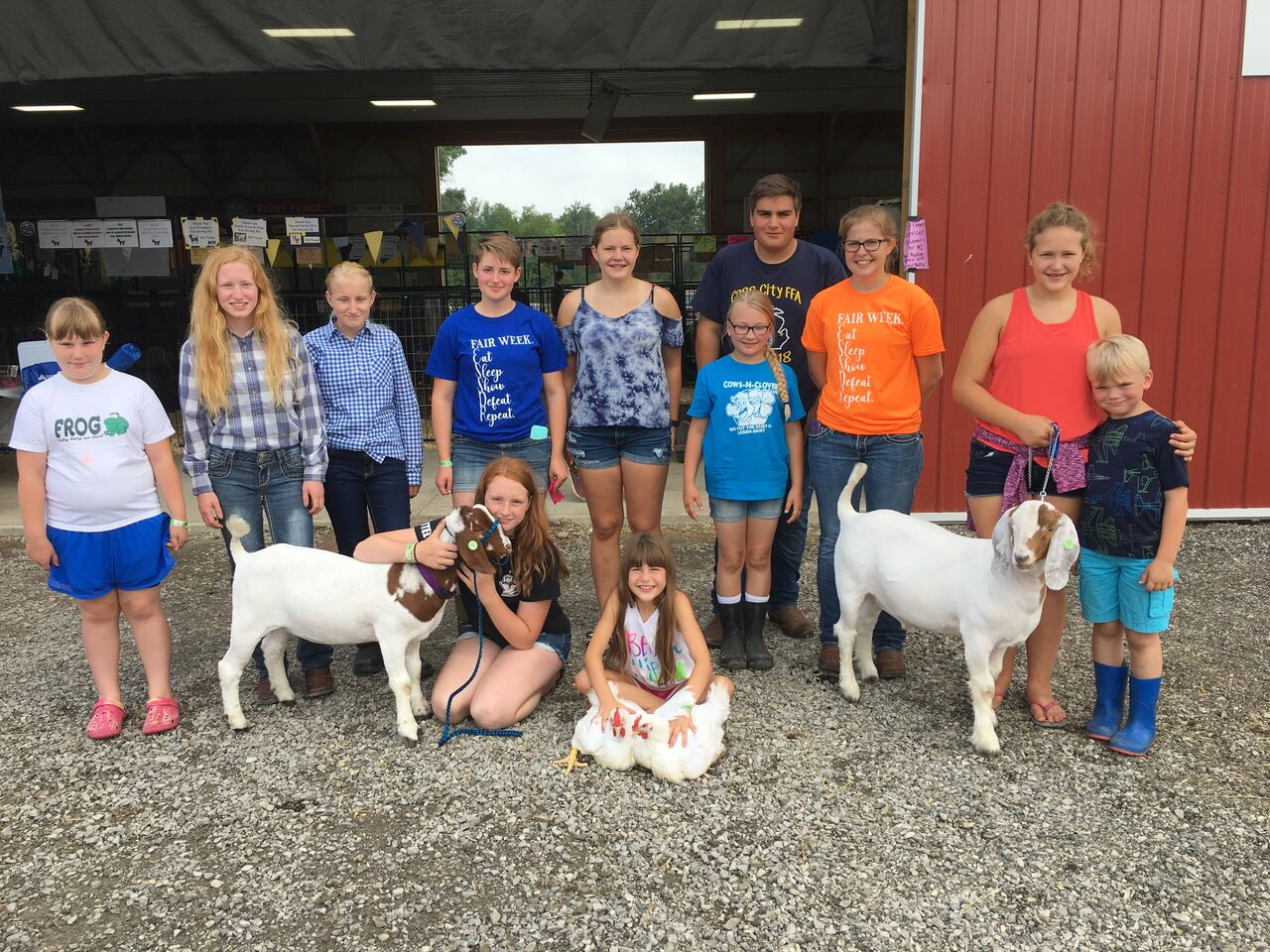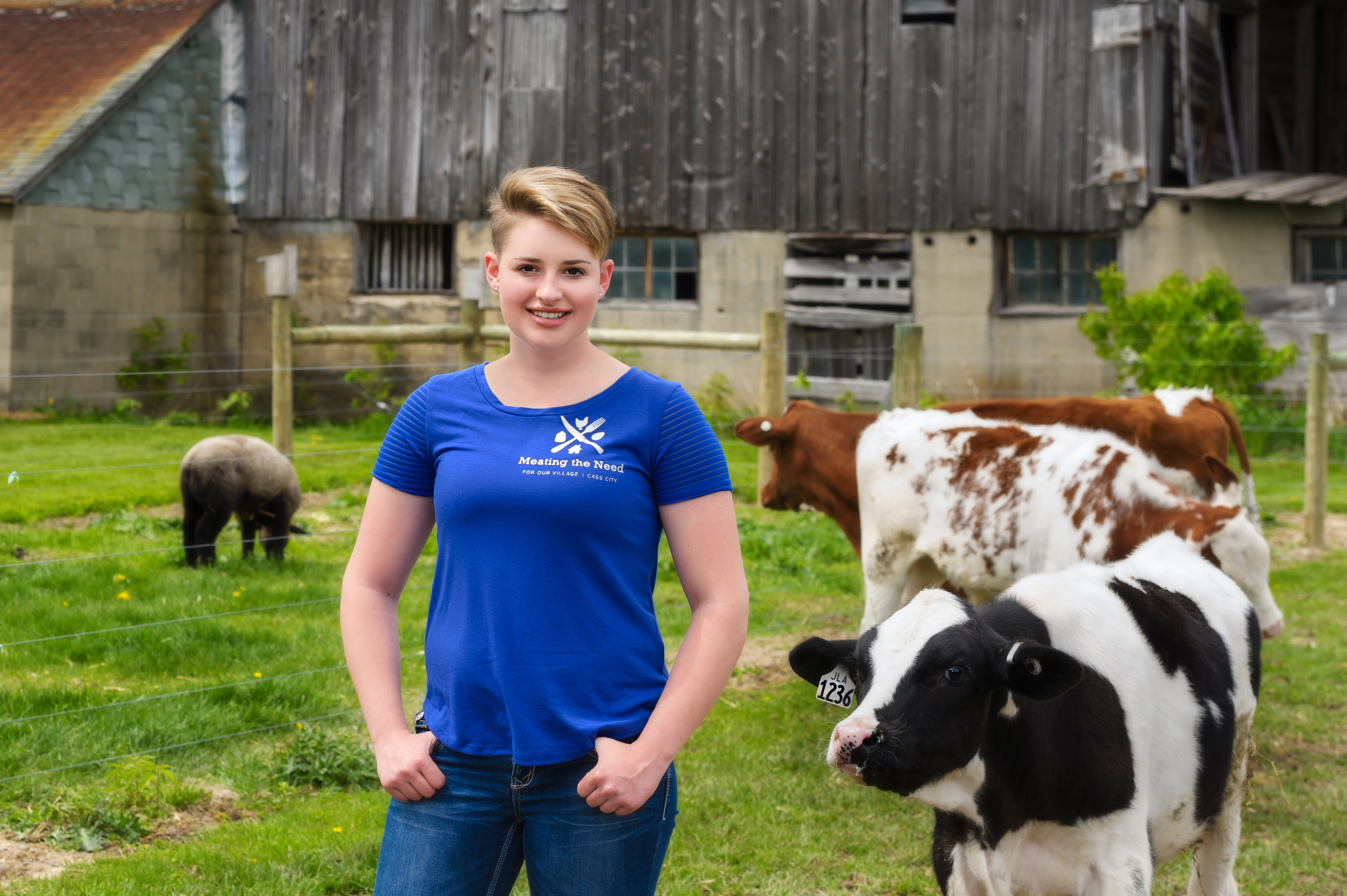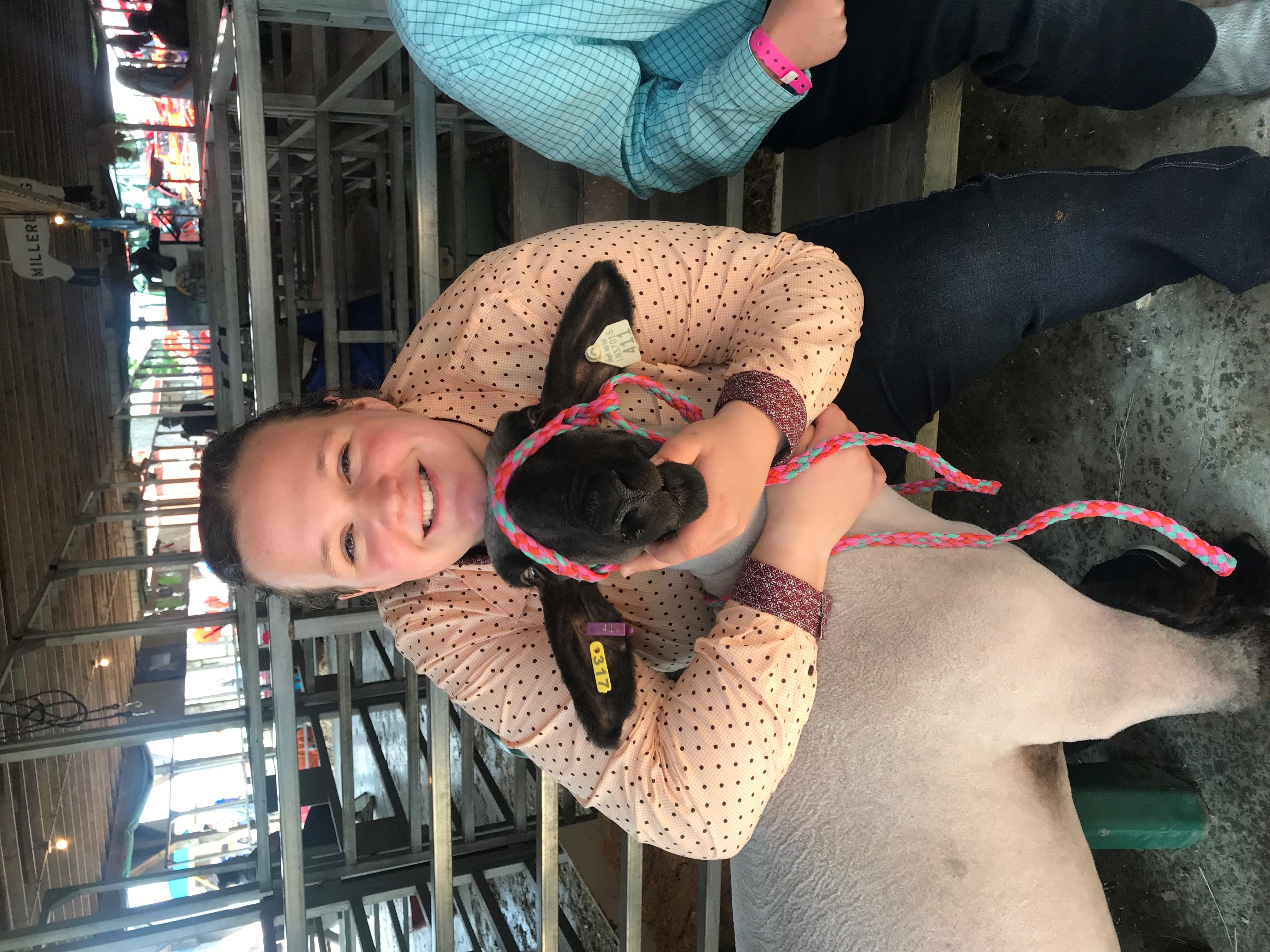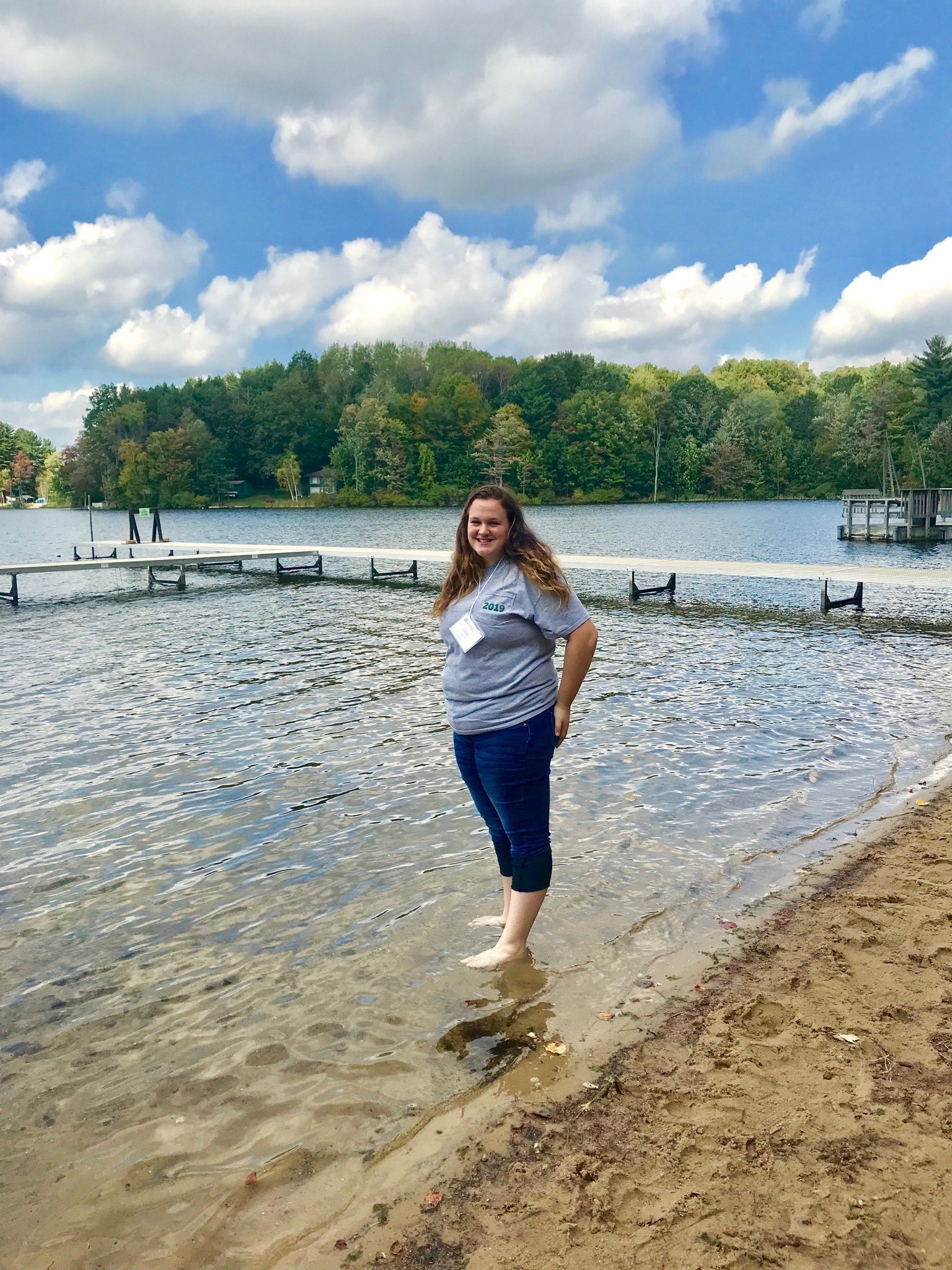

The Sebations, a 4-H family in St. Clair County, re-purposed a fair
billboard thanking our essential workers. This is just one example
of how Michigan 4-H’ers are lending their hands to larger service
during this unprecedented time.
Across the state, county and globe, the novel coronavirus, the virus that causes the infectious disease COVID-19, has upended everyday life in nearly every way. In Michigan, families and communities struggle to adapt to closed schools and businesses while working to preserve their own health, well-being and sense of normalcy. For many Michigan 4-H’ers, lending a helping hand is part of that normal, and many have sprung into action to help their communities during this unprecedented time.
Across the state, 4-H’ers have many ways to serve their communities while practicing social distancing. Among them are:
• Kalkaska County 4-H member Amy Saxton issued a 4-H Dare to Serve Challenge for other 4-H’ers to join in her Cards for a Cause efforts, encouraging youth to send cards to individuals living in adult foster care homes not able to receive visitors at this time.
• Similarly, 4-H’ers in Lapeer and Schoolcraft counties are writing letters and cards of kindness to residents of local
senior centers and nursing homes.
• Alger County 4-H’ers volunteered to shop for seniors who didn’t feel safe traveling to the store to purchase their groceries and other supplies.
• 4-H’ers in Delta, Eaton, Lake, Kalamazoo and Menominee counties have been sewing masks at home to donate to medical facilities in need.
• The Sebations, a 4-H family in St. Clair County, re-purposed a fair billboard thanking our essential workers.
“I continue to be impressed by the overwhelming generosity and creativity of our 4-H members, volunteers and staff across the state to continue the 4-H mission,” said Jacob DeDecker, Michigan 4-H state leader. “Our 4-H community remains committed to helping one another, while still practicing social distancing as directed by local, state and federal agencies.”
Youth aren’t the only ones stepping up in this time of need. Many 4-H program coordinators have come up with creative ways to continue 4-H programming and to promote 4-H.
• Charlevoix and Luce counties created 4-H project bags and activity handouts to include in sack lunches distributed by schools.
• Calhoun, Kalamazoo and Schoolcraft counties sent 4-H activity kits to Cloverbud members (youth aged 5 to 7) with age-appropriate activities such as Science on a Stick, a basil seed planting kit, Be a Nature Detective, Fun Fit Hike, instructions on making an origami clover and some clover coloring pages.
• Alger, Antrim, Crawford, Eaton, Kalkaska, Marquette and Schoolcraft County program coordinators have moved short-term special interest (SPIN) clubs online to engage youth virtually in a variety of topics.
With a sudden halt to many crowd-favorite, statewide face-toface programs, Michigan State University (MSU) Extension staff members quickly converted and developed online content to serve the 4-H community. In addition, many new and exciting programs have been created to connect youth and families virtually with 4-H.
“In tough times, such as the uncertainty surrounding the current novel coronavirus pandemic, we recognize that accessing the vast knowledge and resources of MSU is more important than ever,” DeDecker said.
Online sessions offered have included a variety of topics including Family Yoga, Basics of Credit for Youth, Writing Wednesdays and an Animal Science Lunch and Learn Lecture series. Several counties have also developed county-wide online scavenger hunts. In addition, a Lenawee County 4-H volunteer and teacher is recording chicks hatching and sharing videos online to teach embryology.
MSU Extension has assembled a collection of digital offerings and educational materials in a new Remote Learning and Resources space. Part of this resource pool is a compilation of helpful educational resources for parents and caregivers. To learn
more, visit https://www.canr.msu.edu/rlr

Huron County 4-H’er Addy Stuever Battel and Eaton County 4-H’er Jael Tombaugh rewarded for their selfless efforts.

To celebrate and highlight teens making an impact in the community, Invisalign partnered with National 4-H Council earlier this year to offer 30 $5,000 cash awards to exceptional 4-H members nationwide. Hundreds of applicants submitted amazing public service contributions and projects and this summer, two outstanding Michigan 4-H’ers were rewarded for their efforts with the one-time $5,000 cash prize.
“We’re so proud of these youth, both for their awards and for everything have done throughout their 4-H careers,” said Jake DeDecker, state leader for Michigan 4-H, a program of Michigan State University Extension. “They’re great examples of how 4-H’ers are changing their clubs, communities, country and world.”
Addy Stuever Battel
Addy Stuever Battel could hardly wait to become a Huron County 4-H member at age five. While her uncle’s dairy farm may have been the impetus to join 4-H, Battel says she’s tried about every 4-H educational project once, and raised goats, poultry, lamb, feeder steers, dairy, and pigs. Add public speaking and leadership activities and by age 12, Battel was ready to tackle a major community concern: the only grocery store for 20 miles closed its doors.

No grocery store in her Cass City community of 2,000 meant an inconvenience for some and purchasing food from the local dollar store for others with limited or no transportation. For Battel, this was unacceptable.
“We had seen a lack of protein when volunteering at a food pantry. Families were given a can of tuna, a jar of peanut butter, and a can of beans and that was supposed to be all their protein for three days,” says Battel. “It wasn’t the homegrown meat, fresh milk, and eggs that I got to eat.”
In 2014, Battel enlisted the help of 4-H friends and leaders, parents, and MSU Extension professionals to form Meating the Need for Our Village. To date, the organization has provided more than 11,000 pounds of meat, 3,908 gallons of milk, 680 pounds of cheese, 620 pounds of butter, 350 pounds of produce, and 329 dozen eggs to supplement the food items in local food pantries. The project has also involved more than 500 youth in raising animals and sourcing donations.

Battel notes if there’s anything she and her friends know how to do, it’s how to raise meat. They raised chickens and pigs in their barns at home and at school, sought donations from the Dairy Farmers of America, Michigan Milk Producers Association, and community members, and applied for grants from the American Egg Board and Sodexo.
As Battel finished up her senior year of high school and prepared for college, she asked MSU Extension educators for help to create a succession plan for Meating the Need for Our Village and food security issues. The result was the Cass City Hunger Summit with an impressive list of accomplishments including:
- A youth-led garden action group created four raised garden beds to supply fresh produce for the local food pantry
- A community action group investigated bringing a grocery store to Cass City
- Battel and her team fulfilled IRS 501c3 requirements for Meating the Need for Our Village along with the creation of its mission, vision, by-laws, leadership, and board of directors
“The 4-H program is mind-blowingly wonderful,” says Battel. “It doesn’t matter who you are, what you are interested in – no matter what you want to do, there is a place for you in 4-H. Find something and try it out.”
Battel plans to continue supporting youth empowerment through agriculture while pursuing a degree in environmental studies and sustainability at MSU and says the $5,000 Invisalign ChangeMakers award will be applied to her tuition.
“At 12 years old, society tells you there’s a lot you can’t do,” says Battel. “They ask children what they want to do when they grow up instead of what they’re excited to do now.” Battel is grateful that 4-H made it a priority to help youth tackle the dreams they have today.
For Battel, her skills and knowledge gained through the many 4-H friends, adult volunteers, and MSU Extension professionals she met along her journey to adulthood has not only helped to form and shape her life, but also made a significant impact on her community. In 2020, Ben’s Supercenter, a family-owned grocery store, opened in Cass City and the community no longer needs to travel 20 miles to purchase food.
Jael Tombaugh
Invisalign ChangeMakers $5,000 award winner Jael Tombaugh joined her local Eaton County 4-H at age 10 with a borrowed chicken since she didn’t have an animal of her own. Her first project was a petting zoo, and then she started showing horses and sheep.

“I was a very shy person and I struggled with anxiety,” says Tombaugh. “I really didn’t like to talk to people and would sit in the back and watch and listen.”
But when Tombaugh discovered 4-H leadership and community service projects, she blossomed.
“I can now command a room and speak in front of others without completely freaking out,” says Tombaugh who is now 18.
When Tombaugh witnessed another 4-H member not feeling included because of how they identified, Tombaugh knew she had to do something to help this 4-H member and every 4-H member feel welcome and included. It was the spark of an idea that became the Michigan 4-H LGBTQIA+ Alliance.
“Creating this kind of group was important to make Michigan 4-H a more welcoming, inclusive, equitable place and break down the perceived barriers of ‘who’ belongs in the Michigan 4-H program,” says Tombaugh.
The Michigan 4-H LGBTQIA+ Alliance is a youth-led initiative open to all Michigan youth and 4-H membership is not a requirement. Its main goal is to educate a team of teen leaders in equity and diversity leadership before opening the Alliance to full membership. It is also a safe place for Michigan 4-H youth focused on advocacy, education, and social connections at the local, regional and state levels.
“We currently have 16 teen leaders including myself and Maezie Nettleton, my 4-H partner on the project,” says Tombaugh. “Our whole intent is to have a group of teen leaders – something we can hand off to others so the Alliance can continue, grow, and develop for years to come.”

In addition to teen leaders, adult volunteers from organizations throughout Michigan have also partnered with the Alliance as advisors. So far, the Alliance has held four meetings with the teen group to create plans for opening the Alliance to group membership, increasing social media connections, and training teens in equity and diversity leadership skills.
This fall, Tombaugh will study biology with a focus on pre-veterinary medicine at Albion College. She’ll use a portion of the $5,000 award toward supporting the Alliance and also for her education.
“I want to use the award to show others you can make a difference – everyone has that ability,” says Tombaugh. “The 4-H program is a place for everyone and there is something for everyone in 4-H. It’s not all about animals and you’ll discover the best version of yourself.”
To learn more about joining Michigan 4-H, visit 4h.msue.msu.edu.

Abbey Miller – June 23, 2020
Over 6,052 cloth face coverings have been made by the Michigan 4-H community and donated statewide to those in need.

As the novel coronavirus pandemic, the virus that causes the infectious disease COVID-19, gripped the world, the Michigan 4-H community quickly stepped up to help. In early April, Michigan 4-H youth and families across the state began independently sewing homemade cloth face coverings and donating them to protect the public, essential workers and members of the healthcare workforce. Using basic sewing skills and a few simple supplies, 4-H youth and volunteers tirelessly crafted cloth face coverings in their homes to do their part in the fight against COVID-19.
“It’s inspiring to see Michigan 4-H members and volunteers take the lead to address a real world problem by putting their hands to larger service to meet the needs of their communities,” said Gary Williams, former Wayne County MSU Extension educator and co-coordinator of the Michigan 4-H Mask Project with Anne Kretschmann, MSU Extension 4-H program coordinator in Houghton and Keweenaw counties.
By mid-April, Michigan 4-H centralized these local efforts and created a goal to donate over 5,000 face coverings through the Michigan 4-H Mask Project. The 4-H community quickly met the goal and donated the masks to more than 25 different organizations, with a major shipment being sent to 11 City of Detroit Parks and Recreation food distribution sites. This helped to distribute cloth face coverings to low-income families in the hard-hit Detroit community.
“The cloth face coverings have been donated to over 100 locations statewide, including the Focus Hope Food Program and the Detroit Parks and Recreation Department’s food distribution program,” Williams said. “We’re very proud that our Michigan 4-H members and volunteers have really taken this to heart and are making a large difference for so many people.”
When Maggie Sans, vice president for community relations at Walmart, who is also an Oakland County 4-H alumna and National 4-H Council board member, learned of the Michigan 4-H Mask Project, she was moved to take action. Walmart Foundation made a $10,000 gift to support the Michigan 4-H Mask Project.
“Detroit was a hotspot of growth for COVID-19 and there was an urgent need to provide Detroit area residents with masks that would help them protect themselves and members of the community,” Sans said. “MSU Extension and Michigan 4-H have a legacy of investing in our communities, engaging our youth in solutions, and delivering results.”
The funds donated by the Walmart Foundation will be used to help expand this project with the purchase of additional fabric and elastic necessary to make the cloth face coverings, as well as support for distributing the newly made cloth face coverings to those in need and sending supplies to volunteer mask-makers across the state.
“With the support of the Walmart Foundation, we will be able to replenish the supplies of mask-makers across the state who have so generously donated their time and materials to create cloth face coverings for our statewide effort,” said Amy Bonomi, former director of MSU Extension Children and Youth Programs. “We are grateful to Ms. Sans and the Walmart Foundation for their partnership on this important initiative.”

In addition to the gift from the Walmart Foundation, $1,060 were donated by individuals for the Michigan 4-H Mask Project through #GivingTuesdayNow, a global day of giving and unity that took place on May 5, 2020. To date, more than 6,050 cloth face coverings have been made by the Michigan 4-H community and donated statewide. To help with the distribution, Michigan 4-H also partnered with the Michigan group Crafters Combating COVID. To learn more about the Michigan 4-H Mask Project, visit extension.msu.edu/MI4HMasks.
Cloth face coverings are among the strategies to protect against the spread of novel coronavirus recommended by the Center for Disease Control and Prevention (CDC). Please visit the CDC website for more recommended prevention strategies.

